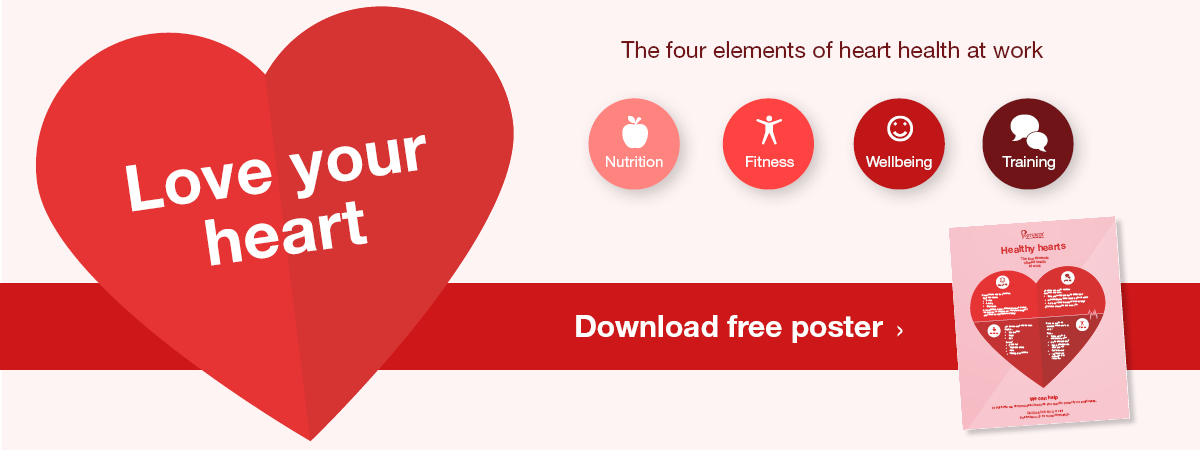 Heart-related illness costs employers more money than any other disease or injury in the workplace. It is also the main cause of death in the UK.
Heart-related illness costs employers more money than any other disease or injury in the workplace. It is also the main cause of death in the UK.
Let's look at the four main areas we can all tackle to improve the heart health of our staff...
1. Nutrition
We can all look after our hearts better by eating well. But eating 'well' isn't that easy when you work in an office carrying out tasks that require a great deal of mental energy - especially when there are birthday cakes or other sugary treats floating around.
It's too easy to reach for a quick 'pick-me-up' as a break from demanding or tedious work. But did you know those daily 'pick-me-ups' could be damaging the long-term health of your heart?
A statement from the Royal College of Surgeons warned that 'sugary office-based snacking is contributing to an epidemic of obesity and poor oral health in this country'. They are urging employers to 'tackle cake culture' and make sure low-sugar snacks are available instead.
Which foods are bad for the heart?
- Saturated fat - found in foods like biscuits, cakes, fatty meat and dairy products. Too much can raise 'bad' cholesterol and increase your risk of heart disease.
- Sugar - eating sugary food raises your heart rate. Any energy you don't use is stored as fat. Carrying too much fat can increase your risk of heart disease and type 2 diabetes.
- Salt - too much can raise your blood pressure, putting you at risk of heart disease and stroke.
Which foods are good for the heart?
- Fruits and vegetables - eat a varied selection of three portions of veg and two portions of fruit a day (i.e. not five bananas).
- Mono and polyunsaturated fats - these are 'good fats' found in oily fish, avocado and nuts. Eat in moderation.
- Whole grains - foods that contain bran wheat, oats, rye, barley etc. are a rich source of nutrients such as B vitamins and iron which are all good for heart health.
What's it got to do with employers?
The loss in productivity and the rise in absenteeism as a result of illness can be costly - so it makes good business sense to provide nutritional advice and healthy snack options in the workplace.
The right food can boost concentration, fuel productivity, and improve heart health.
Google co-founder Sergey Brin allegedly told his office architects: make sure no one is more than 200 feet away from food. This spurred the creation of numerous cafes and micro kitchens peppered about the complex - not only to fuel workers with healthy food, but to encourage interaction between people in the hope it would spontaneously fire up good ideas.
2. Physical activity
The second element of heart health we can all tackle in the workplace is physical activity. To keep your heart healthy, you need to work it once in a while. Being inactive is one of the main causes of death and disability in the UK.
But maintaining an active lifestyle is difficult when you work at a computer all day. Offices are traditionally sedentary spaces. Luckily, there are steps employers can take to increase activity levels even in offices:
- Replace static desks with sit-stand desks or platforms.
- Give out pedometers or wearable fitness trackers and set up a step challenge.
- Encourage walking meetings.
- Organise active social events, such as activity centres, countryside walks and fun runs.
- Make informational posters and leaflets easily accessible so employees know how much activity they should be getting.
The benefits of exercising are far-reaching and often life-changing. They can include:
- Feeling more energised
- Greater concentration
- Lower stress and anxiety
- Healthier appearance
- Lower body fat
- Increased fitness
- Greater confidence
- Better sleep
- Increased self-confidence.
The medical benefits include the decreased risk of:
- Coronary heart disease
- Type 2 diabetes
- High blood pressure
- Obesity
- Some cancers.
3. Wellbeing
Some people in your workplace may already be dealing with a heart issue in their life - whether their own, or someone they know. Whether it's high blood pressure, a heart attack, coronary heart disease, or any other heart-related condition, coming to terms with illness is hard.
This can have a big impact on mental health and employers should make sure there is policy in place to support these people if necessary.
According to the British Heart Foundation, 68% of heart condition sufferers said their mental health has suffered as a result of their illness.
Anxiety was the most common symptom, with 77% saying they suffered from it. Over half (51%) said they had felt low, depressed or tearful, 47% felt scared and 38% felt other people didn’t understand how the condition affected them.
How can employers help?
29% of people with a heart issue said they felt the mental impact of their condition affected their ability to work.
The best thing an employer can do is make sure everyone knows what they should do if they feel their mental health is affecting their work.
Employers can consider developing a bespoke e-learning course with our Q-Pulse WorkRite software developers. An e-learning course is a quick, easy, efficient way to let employees know what they should do if they are suffering from any kind of mental health problem in the workplace. Simply knowing that there is support available can ease the stress and help people cope better at work - hopefully avoiding, where possible, an exacerbation of problems and long stretches of absence. Have a look at our existing FeelRite course.
4. Training and defibrillators
As we reported in our blog about HeartSine defibrillators, for every minute a victim of cardiac arrest doesn’t receive defibrillation, their chance of survival drops by 10%.
Having an automatic external defibrillator on-site is a small cost if it ends up saving a life.
We sell a number of excellent models, including the ZOLL AED Plus Semi & Fully Automatic Defibrillator and HeartSine range.
First aid training is also important should CPR ever be necessary.
Heart health is important and as we've seen in this post, it can be improved and preserved with the right day-to-day habits, information and support.










